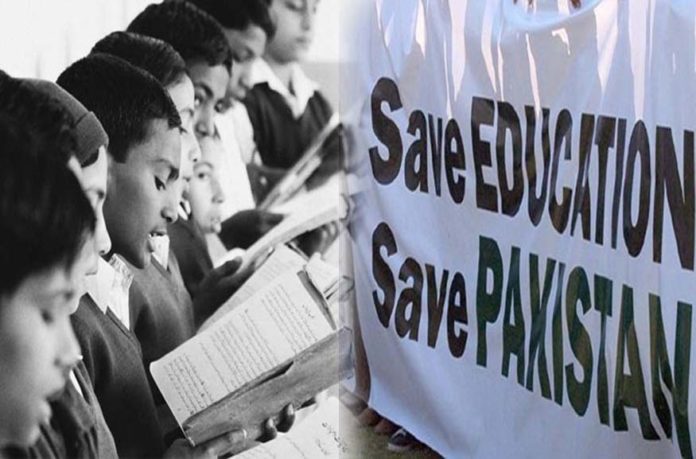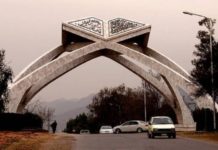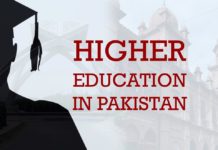Disclaimer: The Eqbal Ahmad Centre for Public Education (EACPE) encourages critical and independent thinking and believes in a free expression of one’s opinion. However, the views expressed in contributed articles are solely those of their respective authors and do not necessarily reflect the position or policy of the EACPE.
A month ago, a father asked to me whether he should send his son to a School or Madrassa (religious school). I had no answer and I wondered perhaps Pakistani Parliament should answer this to a confused parent who wants to educate his kids the best in meager resources. While this dilemma is a source of headache and confusion to parents, in a broader sense it shows how we’re unable to build national narrative when it comes to education.
The root of parent’s confusion is not new, rather it’s linked to pre-partition social fabric. The schooling, based on English and science education, first introduced by the British in the subcontinent, was voraciously embraced by the Hindus, whereas it was resisted by the Muslims. Later, in a newly independent state, Parliament was supposed to decide what the Education Policy would be. But this did not happen the way it was meant to be.
When I reflect back to my school days, I recall how after being castigated by teachers I often considered education as something equivalent to obedience and muteness, along with fear of teacher in classroom. The quality of teaching was so substandard that till class eight none of the teachers taught even single tense of English in Govt. Higher Secondary school (GHSS) in Mansehra, Khyber-Pakhtunkhwa (KPK). Either, teachers didn’t know the subjects they were hired for, or they had morally degraded mentality of placing their own children in private schools, and remaining unconcerned about poor families’ children. Time fled, but the bitterness remained in my mind.
Before uncovering further, here’s another core issue I’m concerned with. Emotional Intelligence (EI), unlike artificial Intelligence (AI), is moulded by the society, especially in school environment. A child, suffering form poor domestic circumstances, when further faces neglect of teachers and grows fear of them, it cultivates a bumpy path for future career for him, which often leads to remorse later. EI incurs form strong, persistent motivation and counselling. It’s helps building critical thinking, and sense of commitment, creativity and self-confidence are downright outcomes of it. Regrettably, EI is extremely neglected in our schools.
It’s the right time to make reforms in curriculum, as well as teachers must be trained enough so that they could spur in students critical thinking, creativity, collaboration, communication and citizenship — 5C’s.
Coming back, whatever circumstance there were, I passed middle school, and learnt questions like, “who’re our enemies?”, “why didn’t we live with Hindus” etc. Then conventionally, I lured for secondary school there at GHSS, where my class was taught just single chapter from Physics book, 3 lessons from English books and one from Biology. I thought to study the curriculum by myself. However, I couldn’t, for the books had been so roughly printed and composed so difficult. I hoped the situation would be fine in college. After matriculation, I joined Govt. College for intermediate (part one) and learned two chapters form Physics, one form Mathematics, and equivocal knowledge of computer science. This is an evidence from a single pupil – me; multiply it with 50 or more number of students to get idea about my class. Unfortunately, this is the story of almost all government schools and colleges.
Recently, Teaching Content Knowledge Assessment Report 2018 revealed that 60% Khyber Pakhtunkhwa primary school teachers can’t teach syllabus. The report didn’t record teacher’s ability to shape students’ EI, but you can guess for yourselves. Also, among the technical hurdles are the parochial training and purchased degrees from the Allama Iqbal Open University (AIOU) in the name of distant learning education. Exams held by AIOU for certified teaching courses are highly cheated that reveals how the nation has reached to the bottom of ethics.
Education is not an absolute term, rather a relative one which keeps on evolving with time. With this line of thinking, it is the compulsion to nation’s administrator to device such a curriculum that synchronizes well with the need of time. Developed countries are making a robust revolution towards Artificial Intelligence, robots and automated machines. Jobs today, performed by janitors, lawyers, doctors, psychiatrists, managers, bookkeepers, nurses, electricians, accountants, and salesperson are highly susceptible to be replaced by automation. Therefore, underdeveloped, and developing countries should focus on so called the “Curriculum of the Future”.
Computational creativity, problem-solving skills, and digital capability must be taught in elementary schools. Many countries including US, UK, Australia, Japan, South Korea, Italy, Malaysia, Sweden and Thailand embrace computer science as a core part of national curriculum. It’s the right time to make reforms in curriculum, as well as teachers must be trained enough so that they could spur in students critical thinking, creativity, collaboration, communication and citizenship — 5C’s.
 The writer, Irfan Khan, is a Researcher of Natural Sciences at Physics Department, Quaid-e-Azam University, Islamabad, Pakistan. He can be reached at ik8828903@gmail.com
The writer, Irfan Khan, is a Researcher of Natural Sciences at Physics Department, Quaid-e-Azam University, Islamabad, Pakistan. He can be reached at ik8828903@gmail.com



 The writer, Irfan Khan, is a Researcher of Natural Sciences at Physics Department, Quaid-e-Azam University, Islamabad, Pakistan. He can be reached at
The writer, Irfan Khan, is a Researcher of Natural Sciences at Physics Department, Quaid-e-Azam University, Islamabad, Pakistan. He can be reached at 




I like your post